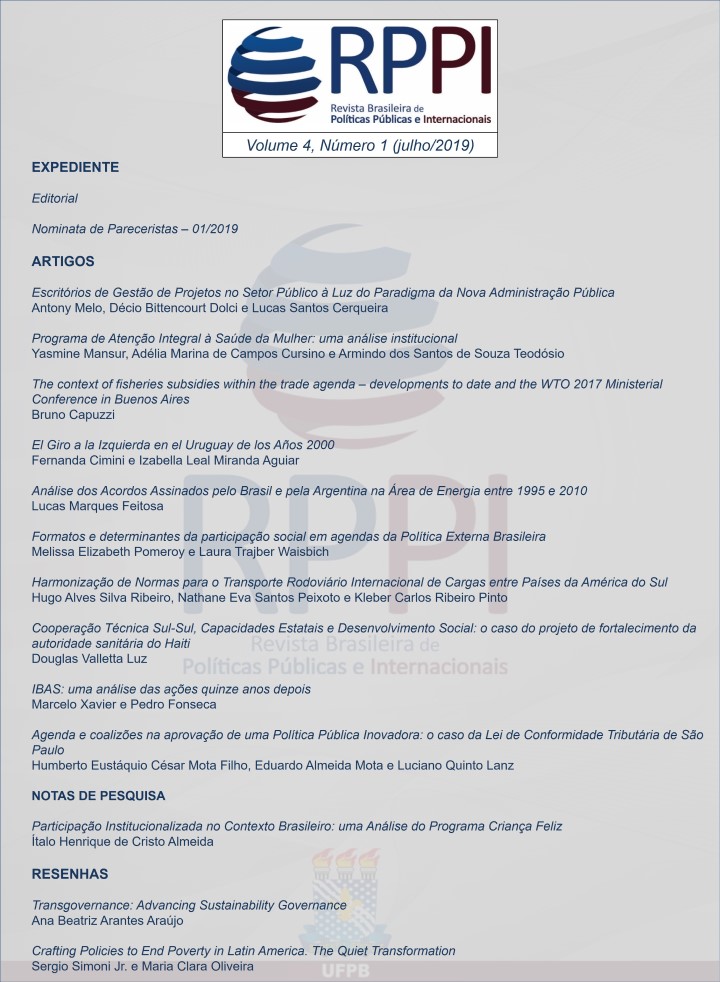The Context of Fisheries Subsidies within the Trade Agenda – Developments to Date and the WTO 2017 Ministerial Conference in Buenos Aires
DOI:
https://doi.org/10.22478/ufpb.2525-5584.2019v4n1.44724Palavras-chave:
Subsídios à pesca, OMC, Pesca Ilegal, Irregular e Não-Reportada, estoques de pesca sobre utilizados, Conferência Ministerial de Buenos AiresResumo
Desde os anos 90, os fóruns multilaterais de negociações têm sido palco de discussões sobre a redução e eliminação de certos subsídios à pesca. O reconhecimento das distorções ao comércio e dos efeitos ambientais causados por este tipo de subsídio não foram, contudo, suficientes para as partes acordarem sobre regras de definições e determinações de subsídios. Com a adoção dos Objetivos de Desenvolvimento Sustentável (ODS) em 2015, no âmbito das Nações Unidas, uma meta de proibição e eliminação de subsídios danosos foi pela primeira vez apresentada aos países. Este artigo descreve as principais negociações e proposições sobre subsídios à pesca com base em documentos oficiais e públicos desde a criação da Organização Mundial do Comércio (OMC), passando pela falta de acordo na 11ª Conferência Ministerial desta Organização em Buenos Aires (2017), e desdobramentos até início de 2019.
Since the 1990s, discussions aiming to reduce and to eliminate certain harmful fisheries subsidies have been taking place at multilateral forums. If the trade distorting effects and the environmental threats of these subsidies are no longer questioned, clear rules on definitions and determination of these practices have not been set giving divergences of approaches and interests of member States of the multilateral trade system. With the adoption of the Sustainable Development Goals in 2015, within the scope of the United Nations, countries were firstly challenged with a clear target to prohibit and to eliminate types of harmful subsidies. This article covers the main developments on the thematic based on official and public documents since the creation of the World Trade Organization (WTO) and tackle the major proposals tabled in anticipation to the Organization`s 11th Ministerial Conference, in Buenos Aires in 2017, and its progresses until beginning of 2019. It also concludes that lack of technical cooperation and convergent interest made impossible for the Conference to drawn conclusive line under any sort of definition.
Downloads
Referências
BAHETY, S. MUKIIBI, J. (2017) “WTO fisheries subsidies Negotiations: Main Issues and Interests of Least Developed Countries”. Geneva: Cuts International
FAO, (2016) The State of World Fisheries and Aquaculture
LEVI, M. MURPHY, G. (2006) “Coalitions of Contention: the case of the WTO Protests in Seattle”. Hoboken: Blackwell Publishing
PORTER, G. (2002) “Fisheries Subsidies and Overfishing: Towards a Structured Discussion”. Geneva: UNEP.
UNCTAD (2016) Trade and Environment Review 2016: Fish Trade
Downloads
Publicado
Edição
Seção
Licença
Autores que publicam nesta revista concordam com os seguintes termos:- Autores mantém os direitos autorais e concedem à revista o direito de primeira publicação, com o trabalho simultaneamente licenciado sob a Licença Creative Commons Attribution que permite o compartilhamento do trabalho com reconhecimento da autoria e publicação inicial nesta revista.
- Autores têm autorização para assumir contratos adicionais separadamente, para distribuição não-exclusiva da versão do trabalho publicada nesta revista (ex.: publicar em repositório institucional ou como capítulo de livro), com reconhecimento de autoria e publicação inicial nesta revista.
- Autores têm permissão e são estimulados a publicar e distribuir seu trabalho online (ex.: em repositórios institucionais ou na sua página pessoal) a qualquer ponto antes ou durante o processo editorial, já que isso pode gerar alterações produtivas, bem como aumentar o impacto e a citação do trabalho publicado (Veja O Efeito do Acesso Livre).




_.jpg)






.png)


.jpg)
_.png)
